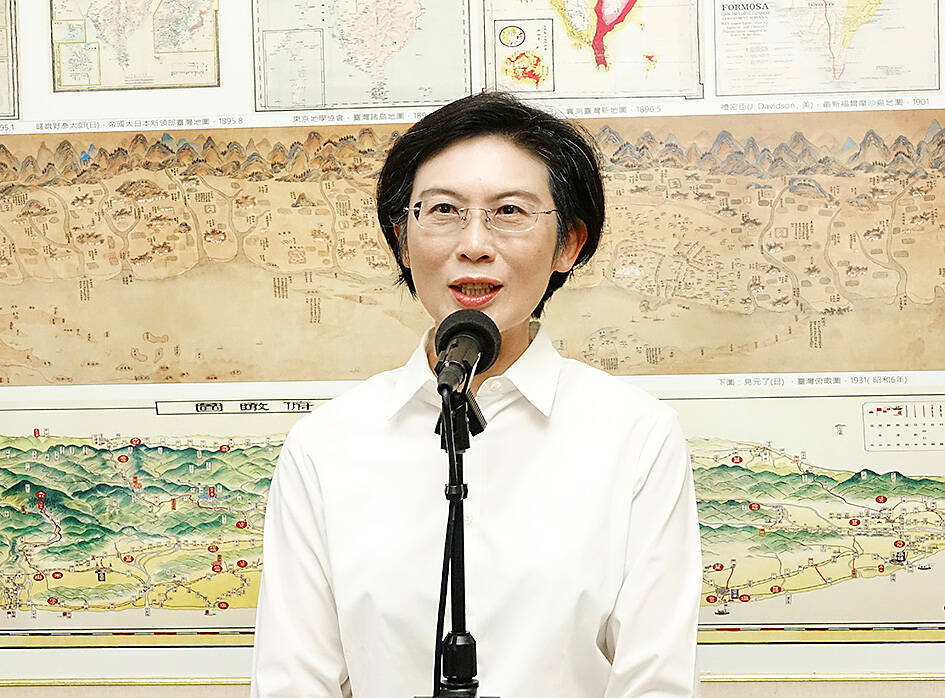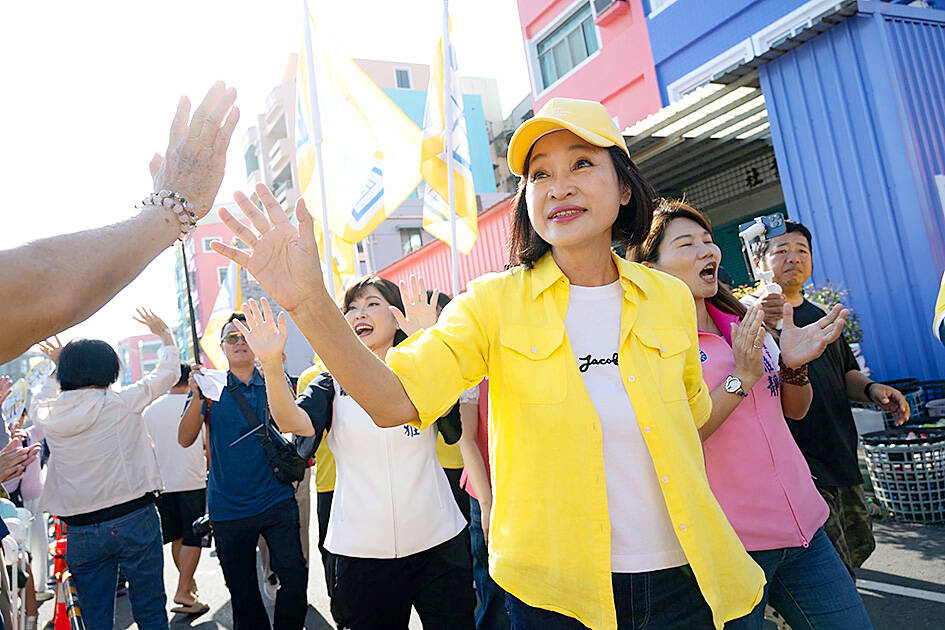Chinese Nationalist Party (KMT) Chairwoman Cheng Li-wun (鄭麗文) has pledged to “flip the south” next year, with high hopes of storming Democratic Progressive Party (DPP) strongholds Kaohsiung and Tainan. Inaugurated on Nov. 1, Cheng is now focusing on next year’s election.
The DPP’s election campaign for next year under party Chairman William Lai (賴清德) got off to a surprisingly early start and is already well underway. The party has already chosen six of the 22 candidates for city and county leaders, with two incumbents and four challengers.
The DPP got mauled in 2022, winning only four leadership posts, including the big prizes of Tainan and Kaohsiung, on the strength of their popular incumbents. Both incumbents will be term-limited out next year, opening up both cities to new challengers.

Photo: Tien Yu-hua, Taipei Times
Cheng — who hails from the southern county of Yunlin — has good reasons for thinking the south is in play for the KMT. She will be devoted full-time to helping KMT candidates win, while her opponent Lai has a day job as president, which is presumably distracting.
More importantly, the DPP is riven with brutal factional infighting in both cities, while the KMT has strong frontrunners.
In this column, we will focus on Kaohsiung. The DPP’s problems there weave together history from the early days of the party, factional warfare rising to the national level, sex, intrigue, allegations of corruption and a religious guru.

Photo: Tsai Ching-hua, Taipei Times
At the center of the storm is mayoral candidate and DPP Legislator Lin Tai-hua (林岱樺), one of four frontrunners to represent the party. Despite an ongoing trial for corruption and a string of allegations, she is standing resolutely defiant in the face of calls to exit the race.
On the KMT side, the smart and articulate Ko Chih-en (柯志恩) stands alone as the presumed candidate.
FRACTURED FIELD
Not long ago, it looked likely that rising star and DPP Legislator Chao Tian-lin (趙天麟) had a lock as the party’s nominee to replace Kaohsiung Mayor Chen Chih-mai (陳其邁). Chao was a popular and likely unifying figure in this DPP-leaning city.
Then it was discovered he had had an extramarital affair with a Chinese woman, and a “Chinese” woman not in the sense of KMT Chairwoman Cheng’s “Taiwanese are Chinese,” but a woman from Communist China. In the pro-Taiwan DPP, this was political suicide.
This left a disunified field with each potential candidate backed by different factions, and with their own local support bases, but none with city-wide recognition. Now Lin Tai-hua has city-wide recognition, but not entirely for good reasons.
Despite her offices being raided in a corruption probe in February, and being formally charged along with nine others in June, she was until recently still leading in the polls — but not by enough to knock out her opponents.
The Kaohsiung District Prosecutors’ Office accused Lin of using the names of relatives and others — including a Buddhist master at Kaohsiung’s Dongfa Temple (通法寺) — to embezzle NT$14.73 million (US$495,393 at the time) of assistant wages, along with fraudulently claiming NT$220,000 for overtime work by assistants from 2011 to 2014. She claims her finances during that period were managed by her father, former mayor of then-Fongshan City (鳳山), Lin San-lang (林三郎), and after his passing, these tasks fell to her sister, who has also been indicted for alleged embezzlement from January 2021 to November last year.
These allegations are similar to those impacting many politicians across party lines, and is quite common — with many arguing that the laws governing assistant wages are themselves part of the problem. Regardless of whether that case is legitimate or not, Lin said in a statement, “I will survive this storm and will work and take action to prove that I am innocent of the charges.”
Then in August, Mirror Media published leaks from court records, including some private texts with family friend and monk Shih Huang-chih (釋煌智). These were very intimate communications.
With quotes taken out of context, but without explicitly saying it, Mirror Media made it appear as if the relationship between the two was inappropriate, perhaps even physical.
By all accounts, Lin is very religious, and read in context, the comments have a far simpler explanation. Though not religious myself, it seems reasonable that a relationship with a spiritual guide and friend would naturally involve revealing emotions, and her word choices fit that type of relationship far more closely than what Mirror Media appeared to be implying.
By September, she was still polling respectably well, but lost her lead. In October, she faced the DPP’s anti-corruption committee and presented four boxes of documents in her defense. They have yet to release any ruling.
DEFIANT RALLY
The pressure on her to quit the race was intensifying, but in a show of force last Saturday, she held a major rally in Kaohsiung’s Gangshan District (岡山). The press always exaggerates crowd sizes and claimed that she drew 30,000 people, but though the real number was clearly lower, it was still an impressively large rally and demonstrated she has a strong support base.
The press focused on her apparent suggestion to supporters to tell pollsters they were in the 20-30 age demographic, which is puzzling and counterproductive, but could be construed as attempting to rig poll results.
From the stage, she said that once she surged ahead in the polls she became a target, and accused prosecutors and investigators of distorting past witness testimony, fabricating statements from deceased individuals, and forcibly trying to frame her for corruption. She accused prosecutors of being deliberately intent on destroying her political life.
Prior to the rally, major figures from her DPP faction — Taiwan Normal Country Promotion Association (TNCPA, 正常國家促進會, usually abbreviated to 正國會) — including Foreign Minister Lin Chia-lung (林佳龍) publicly called for supporters to attend.
After harsh criticism from inside the party, all those major figures skipped the rally, which was likely a humiliating climb-down for a faction that has suffered significant setbacks recently. The chances of a factional rift between the TNCPA and their nominal allies in Lai’s dominant New Tide faction must be increasing.
The DPP is understandably concerned about running a candidate on trial for corruption against the KMT’s formidable Ko. Why is Lin so determined to forge on?
In the 1980s, the KMT’s Kaohsiung County Black faction broke with the party and switched sides to support Dangwai opponents, who later helped form the DPP. Her father, with ties to figures in the Black Faction, became Fongshan City’s first DPP mayor in the 1990s.
Lin grew up in this formative period as Taiwan transitioned to democracy, and threw herself wholeheartedly into the process, starting from the ground up. This is who she is; politics is her life.
That such a large number of supporters rallied to her side, despite all her troubles, demonstrates the depth of her support after years of serving her constituents.
She has thrown down the gauntlet and stated she will run to the end. She has also said that she will respect the results of the DPP primary.
This puts the DPP in a quandary. If, for example, the DPP’s anti-corruption committee were to put a stop to her run, will she call foul?
Though she currently says she will not run as an independent, if she feels the DPP is rigging the primary against her, will she change her mind?
The primary is scheduled for January 12-17 and will be conducted through opinion polling.
If the DPP handles this badly, she could split the ticket and cause factional chaos within the party. However, if she wins the primary and is convicted of corruption, the consequences for the DPP in Kaohsiung could be dire.
This is a race to watch.
Donovan’s Deep Dives is a regular column by Courtney Donovan Smith (石東文) who writes in-depth analysis on everything about Taiwan’s political scene and geopolitics. Donovan is also the central Taiwan correspondent at ICRT FM100 Radio News, co-publisher of Compass Magazine, co-founder Taiwan Report (report.tw) and former chair of the Taichung American Chamber of Commerce. Follow him on X: @donovan_smith.

US President Donald Trump may have hoped for an impromptu talk with his old friend Kim Jong-un during a recent trip to Asia, but analysts say the increasingly emboldened North Korean despot had few good reasons to join the photo-op. Trump sent repeated overtures to Kim during his barnstorming tour of Asia, saying he was “100 percent” open to a meeting and even bucking decades of US policy by conceding that North Korea was “sort of a nuclear power.” But Pyongyang kept mum on the invitation, instead firing off missiles and sending its foreign minister to Russia and Belarus, with whom it

When Taiwan was battered by storms this summer, the only crumb of comfort I could take was knowing that some advice I’d drafted several weeks earlier had been correct. Regarding the Southern Cross-Island Highway (南橫公路), a spectacular high-elevation route connecting Taiwan’s southwest with the country’s southeast, I’d written: “The precarious existence of this road cannot be overstated; those hoping to drive or ride all the way across should have a backup plan.” As this article was going to press, the middle section of the highway, between Meishankou (梅山口) in Kaohsiung and Siangyang (向陽) in Taitung County, was still closed to outsiders

Many people noticed the flood of pro-China propaganda across a number of venues in recent weeks that looks like a coordinated assault on US Taiwan policy. It does look like an effort intended to influence the US before the meeting between US President Donald Trump and Chinese dictator Xi Jinping (習近平) over the weekend. Jennifer Kavanagh’s piece in the New York Times in September appears to be the opening strike of the current campaign. She followed up last week in the Lowy Interpreter, blaming the US for causing the PRC to escalate in the Philippines and Taiwan, saying that as

The Chinese Communist Party (CCP) has a dystopian, radical and dangerous conception of itself. Few are aware of this very fundamental difference between how they view power and how the rest of the world does. Even those of us who have lived in China sometimes fall back into the trap of viewing it through the lens of the power relationships common throughout the rest of the world, instead of understanding the CCP as it conceives of itself. Broadly speaking, the concepts of the people, race, culture, civilization, nation, government and religion are separate, though often overlapping and intertwined. A government